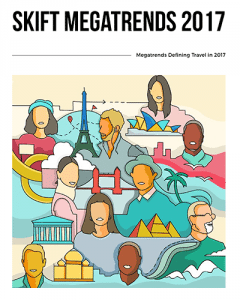Skift Take
Airbnb’s entry into the tours and activities market certainly brings the sector to the fore. If Airbnb sticks with a strategy to curate its tours and activities, going with unique and off-the-beaten-path experiences, then that is still important for the sector given Airbnb’s scale, but self-limiting. Competition is certainly a healthy thing and all the players will have to up their games.
Earlier this month we released our annual travel industry trends forecast, Skift Megatrends 2017. You can read about each of the trends on Skift, or download a copy of our magazine here.
Download Your Copy of Skift Megatrends 2017
Big travel brands, including TripAdvisor, Airbnb, Google, Expedia, and to a lesser extent, Booking.com, are finally embracing online bookable tours and activities, signaling that the sector is finally becoming a focal point for the largest online travel companies.
For example, TripAdvisor’s non-hotel segment — including vacation rentals, restaurants, and attractions — grew 35 percent in the third quarter of 2016 to $101 million, while TripAdvisor’s hotel segment, which is more than three times the size of non-hotel, slumped 6 percent. As TripAdvisor’s Viator unit continues to aggregate what it considers to be the most popular tours, the segment clearly shows signs of being on the upswing as a burgeoning trend.
That doesn’t mean that the majority of tours and activities will be online bookable anytime soon. TripAdvisor CEO Stephen Kaufer says it takes considerable effort to bring tours and activities online for a variety of reasons, and that’s why the company focuses on bringing online what it considers to be the most-wanted attractions.
Kaufer says one big challenge for TripAdvisor — and all the players, too — is serving up the right tour to the traveler at the right time. The entire industry has a long way to go in figuring out how to serve up relevant content at the appropriate time.
Airbnb’s launch of Magical Trips in about a dozen select cities certainly brings tours and activities into broader view. Airbnb is just getting going in the sector, which will be characterized by competing players with different strategies. When TripAdvisor acquired tours and activities provider Viator in 2014, Viator’s strategy was to curate the best tours in popular destinations. But under TripAdvisor, Viator changed its strategy to try to aggregate as many attractions as possible, and that strategy switch has spearheaded growth. Airbnb, on the other hand, states that it will curate its tours, aiming for unique and memorable experiences. That strategy would seem to limit Airbnb’s tour horizons, although, as with Viator, strategies do pivot.
Google’s Trips app and Airbnb’s product launch highlighted how tours and activities on mobile have arrived. Google’s Trips app, while not providing any booking capabilities at launch, suggests in-destination itineraries and increasingly makes recommendations contextually by time of day or season. Gogobot, which now calls itself Trip.com, leads the way as well, and uses artificial intelligence to make tour suggestions based on the weather, time of day, and personal preferences, for example.
As a group, some of the back-end technology players, which provide connectivity, data, and analytics tools to operators, appear to be making strides in picking up customers and bringing them online. These tech providers, some of which offer direct-to-consumer sites as well like Peek, are now helping tours and activities operators professionalize their ranks.
In addition to offering them the capability to run sophisticated revenue reports, automated email services, and manage at least a portion of the business through mobile apps, these back-end tech providers enable operators to more efficiently allocate equipment and seats at the time of booking, with the aim to limit overbookings and cancellations.
Mobile innovation in tours and activities is just now picking up speed. Consumers can increasingly book online in advance, and some companies, like the old-school player Trafalgar, have added an attractive human element, allowing participants to journal and share photos on their app.
But consumers want even more than that. They want their tours and activities on-demand. In the age of instant service from Uber, Seamless, and HotelTonight, people have less and less patience. If they can’t book it easily right now, while they’re in the mood, they might not book it at all.
Download Your Copy of Skift Megatrends 2017

The Daily Newsletter
Our daily coverage of the global travel industry. Written by editors and analysts from across Skift’s brands.
Have a confidential tip for Skift? Get in touch

